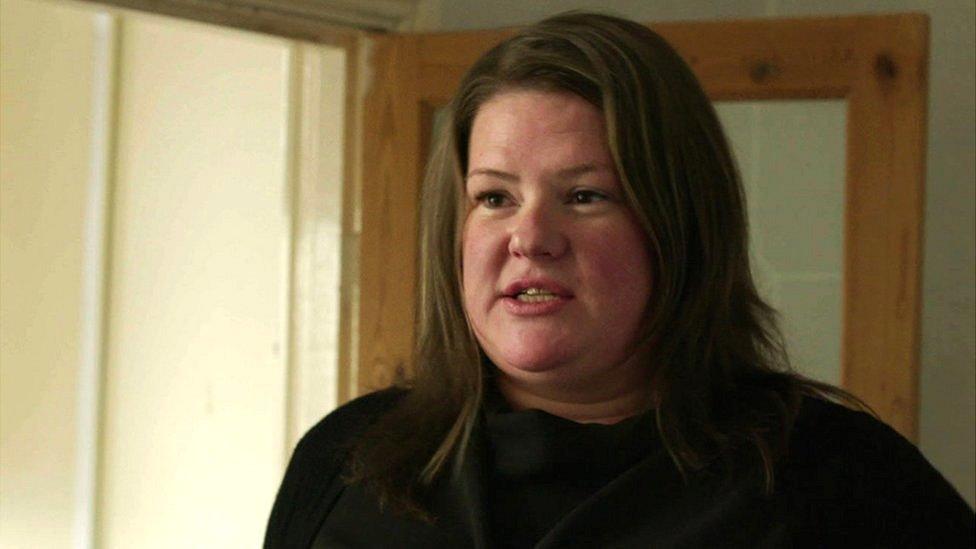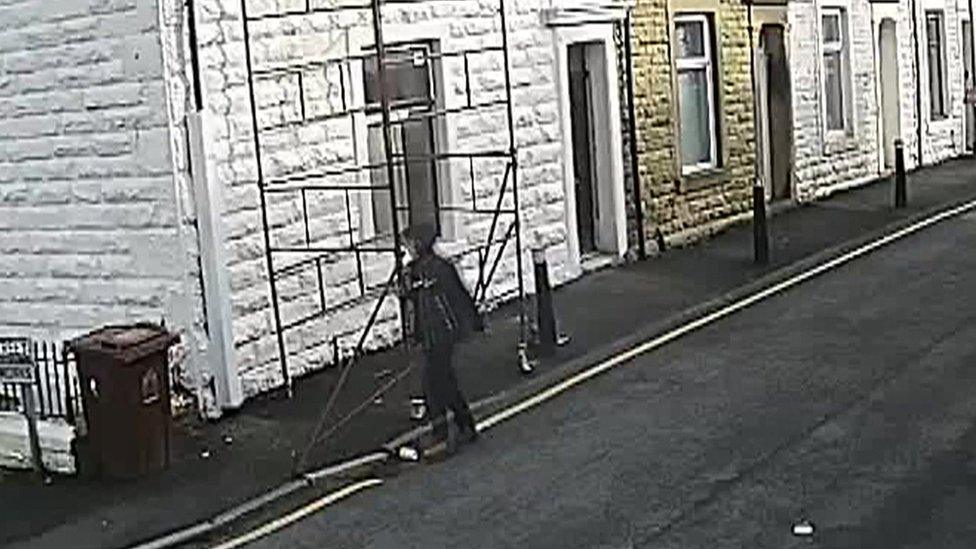'I told police who my burglar was - but they did nothing'
- Published
CCTV of the alleged burglar at Sarah Goode's house - she says police were not willing to act on footage even though she identified the suspect
A woman whose home was burgled as she slept says the police would not question the man she had identified from CCTV as the offender.
Sarah Goode from Blackburn told BBC Panorama that officers "were not prepared to do anything".
The programme investigated further and found more CCTV - it showed the offender going in and out of her house.
Lancashire Police says it recognises the impact crime has on victims and that tackling burglary is a priority.
Ms Goode's case comes as research commissioned by Panorama suggests police forces are facing an increased workload.
The independent criminal justice think tank Crest Advisory says England and Wales need an extra 18,000 officers just to keep up with population growth since 2010.
While the Home Office says there are now 149,500 police officers in England and Wales - the highest number on record - the think tank says recruitment has fallen behind the 9.1% increase in population since the start of the previous decade.
According to Crest, there are now just 3.88 officers for every 1,000 people - down from 4.42 in 2010.
'They did nothing'
When Ms Goode's home was burgled, Lancashire Police failed to collect CCTV from all of her neighbours.

Sarah Goode says she was "furious" the police did not question the suspect or return to collect CCTV
She gathered some footage herself and identified a former friend acting suspiciously outside her house - but Lancashire Police still did not question him or come back for the rest of the CCTV.
Sarah sent the suspect a series of angry messages and ended up getting her stolen car keys back - she found they had been thrown into her back yard.
But her other possessions haven't been returned. She added: "I actually wanted the police to do something about it. And they did nothing. It's not OK."
The suspect says he did not burgle Sarah.

Sarah Goode told police she recognised a man filmed acting suspiciously outside her house
Panorama obtained CCTV footage from three neighbours that the police had failed to collect.
It showed the offender going round the back of Ms Goode's home at 04:00, before coming out of her front door. The man then goes back into her house before coming out with what appears to be a bag of her possessions.
Lancashire Police says it deployed crime scene investigators, completed house-to-house enquiries and obtained CCTV footage before Sarah's case was closed.
Inexperienced new recruits
The police watchdog has told Panorama that officers are failing to get the basics right and that public confidence is at the lowest level he could remember.
While 20,000 officers across the county have been hired since 2019 to replace those laid off during the years after 2010, Andy Cooke, HM Inspector of Constabulary, said this in effect meant experienced officers had been replaced with new recruits.
"Obviously, the level of inexperience now is quite significant," he said. "By next year, about 30% of officers will have under five years' service and most of those will be on the front line."

Will My Crime Be Solved?
Only one in 20 crimes in England and Wales result in someone being charged. Bronagh Munro meets victims left to investigate their own crimes and seeks the criminals who have escaped justice.
Watch on BBC iPlayer (UK Only) or on BBC One at 20:00 on Monday 8 January (20:30 in Northern Ireland)

As well as dealing with a growing population, the police are also facing more complex and severe crimes than before.
The Office for National Statistics (ONS) produces an average crime severity score for England and Wales that ranks offences according to their seriousness, with greater weighting given to violent crimes. It has gone up more than 50% since 2010.
With severity of crime and rising population figures factored in together, Crest has calculated that 114,000 additional officers are needed to meet demand in England and Wales.
Crest's executive director Harvey Redgrave says urgent action is needed.
He added: "It's not necessarily realistic to expect officer numbers to meet the level of demand, but it does demonstrate that the level of police uplift that we've seen is in no way equipping the police to be able to respond to the scale of the problem that they face."
The number of recorded crimes in England and Wales are at record levels and only one in 20 offenders get charged with their crimes. Some of the rise in recorded crimes is down to improvements in the way the police identify and record offences. Victims may also be more likely to report crimes.
The ONS says the National Crime Survey is a better measure of long-term trends - and that shows crime as having fallen significantly in the past 30 years. But the survey doesn't include common crimes such as shoplifting, drug possession, stalking and harassment. Nor does it include any crimes against businesses or children under 16.
A Home Office spokesperson said: "Police officers across the country do an incredible job every day, but we are clear that there is more to do.
"We have launched action plans to tackle anti-social behaviour and retail crime and we welcome their commitment to pursue all reasonable lines of enquiry, ensuring more crimes are being solved and public confidence is improved."
The spokesperson said the public was already seeing improvements and that communities were safer.

Are you affected by the issues raised in this story? Share your experiences by emailing haveyoursay@bbc.co.uk, external.
Please include a contact number if you are willing to speak to a BBC journalist. You can also get in touch in the following ways:
WhatsApp: +44 7756 165803
Tweet: @BBC_HaveYourSay, external
Please read our terms & conditions and privacy policy
If you are reading this page and can't see the form you will need to visit the mobile version of the BBC website to submit your question or comment or you can email us at HaveYourSay@bbc.co.uk, external. Please include your name, age and location with any submission.